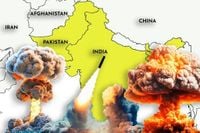Amid escalating tensions between India and Pakistan following a deadly terrorist attack in Pahalgam, Kashmir, on April 22, 2025, Pakistan's Defence Minister Khawaja Asif has issued a stark warning that could reverberate across the globe. Asif declared, "If not us, then there will be no one," emphasizing that any attack on Pakistani territory would trigger a catastrophic response. His remarks come as the two nuclear-armed nations find themselves on the brink of conflict, raising fears of a potential nuclear confrontation.
In an interview with Samaa TV, Asif stated, "If our security is threatened, we will fight back with full aggression." He underscored Pakistan's military readiness, noting that the country possesses approximately 170 nuclear warheads, a figure comparable to India's arsenal. Although Pakistan lacks long-range intercontinental ballistic missiles (ICBMs), its shorter-range missiles capable of carrying atomic warheads could still inflict devastating damage on major cities. Asif warned that even a limited nuclear exchange could result in tens of millions of immediate casualties, compounded by the long-term effects of radiation and the potential for a global nuclear winter.
Asif's comments come in the wake of a massacre at a tourist resort in Pahalgam, where 26 people were killed, prompting India to accuse Pakistan of harboring terrorists. He accused Indian Prime Minister Narendra Modi of promoting terrorism in Pakistan's Khyber Pakhtunkhwa and Balochistan regions, drawing a parallel between Modi and Israeli Prime Minister Benjamin Netanyahu. "Modi is bringing the region to the brink of nuclear war," Asif asserted, suggesting that Modi's actions are driven by political ambition and ego.
While Asif believes that any military confrontation with India would likely be confined to the Line of Control in Kashmir, he cautioned that such a conflict would be unpredictable. He emphasized that Islamabad would view any deprivation of its water resources, particularly concerning the 1961 Indus Water Treaty, as an act of war. Asif stated, "If India constructs any structure to stop our water, it will be destroyed. Water is our red line. Future wars will be over water."
The situation has intensified further with the launch of 'Operation Sindoor' by the Indian Armed Forces on May 6, 2025. This operation targeted nine sites in Pakistan and Pakistan-administered Jammu and Kashmir, where terrorist activities against India have been orchestrated. The Indian Ministry of Defence described the military strikes as a response to the Pahalgam attack, which claimed the lives of 25 Indians and one Nepali citizen.
Reports indicate that the Indian military successfully struck several terrorist camps, including those associated with the Jaish-e-Mohammad and Lashkar-e-Taiba groups, located in Bahawalpur, Muridke, and other sites across the border. The Indian Army asserted that its actions were "focused, measured, and non-escalatory in nature," and that no Pakistani military facilities were targeted. However, Pakistan has claimed that three individuals were killed and 12 others injured in the missile strikes.
In response to the strikes, Pakistani Prime Minister Shehbaz Sharif condemned India's actions as an "act of war," asserting that Pakistan has the right to retaliate. Asif echoed this sentiment, vowing that Pakistan would respond "with full force" and that its response would be both kinetic and diplomatic. He further stated, "All places are open for the international media to verify if they targeted terrorists’ camps or civilians."
The Pakistani government has since declared an emergency at major airports in Lahore and Sialkot, anticipating further military action. In addition, Pakistan's airspace has been closed for 48 hours in response to the Indian strikes. As tensions mount, the situation remains precarious, with both nations on high alert.
In the backdrop of these developments, India's National Security Adviser Ajit Doval has communicated with his counterparts in the United States, United Kingdom, Saudi Arabia, UAE, and Russia to inform them of the military actions taken. The Indian government has emphasized its commitment to holding those responsible for the Pahalgam attack accountable.
Asif's comments and the subsequent military actions underscore the fragile state of relations between India and Pakistan, which have been marred by a history of conflict and mistrust. The two nations have fought four wars since their partition in 1947, and the specter of nuclear conflict looms large over the region.
As the world watches closely, the potential for escalation remains high, with both sides entrenched in their positions. The international community is urged to intervene and facilitate dialogue to de-escalate tensions and prevent a catastrophic outcome.
With both nations on the brink, the question remains: can diplomacy prevail in a situation where the stakes are so high?


